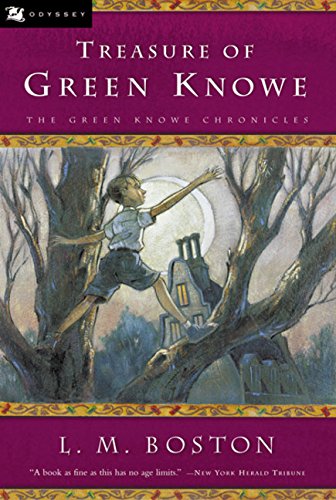
 Treasure of Green Knowe by Lucy Boston
Treasure of Green Knowe by Lucy Boston
Tolly has returned to Green Knowe and his Grandmother full of excitement at being there once more, but an unhappy surprise lies in wait for him: the portrait of the children Toby, Alexander and Linnet is missing from the wall. It would seem a small loss but for the fact that its absence means that the children’s spirits are also not present in the house.
Grandmother Oldknow explains the painting’s loss due to poor finances, though soon sparks hope in Tolly for its return due to the tale of the missing treasure of Green Knowe (which he vows to find), and stories of another family ancestor: Susan Oldknow. Born to a vain mother, a kind but absent father, a spoilt older brother Sefton, and an overly pious grandmother, Susan knows her blindness is a terrible blow to the family’s pride: “I can’t take her into society, she’ll never be married, and I’ll have her always!” her mother laments when the sad truth is revealed.
Smothered by a good-hearted but utterly disillusioned Nanny, Susan is not allowed to do a thing on her own, till her Captain father brings back a gift from his travels that shocks the entire family: a West Indian boy named Jacob to keep her company. Their extraordinary friendship can only be describe through L.M. Boston’s beautiful prose, as when the two meet:
“Who is it Papa?” Susan asked. Jacob answered for himself, in a voice whose smallest half-utterance she was never afterwards to mistake for any other. “It’s me, Missy.”
As with Tolly’s previous summer in the house, the line between past and present blurs, and he once again interacts with the older inhabitants of the house, though this time in a far more influential manner, going so far as to actively participate in the stories his Grandmother tells him each night. While other time-traveling stories leave me completely cross-eyed, the Green Knowe stories treat it as something utterly natural, and thus so do the readers.
As a sequel to Children of Green Knowe, this second part (also published as Chimneys of Green Knowe) is undoubtedly superior to its predecessor. Though I missed Toby, Alexander and Linnet, their part in the first story was as whimsical spirits — Susan and Jacob have a definite story assigned to them, and interact with Tolly in a more important way, stirring events into being on both sides of the centuries.
Lucy Boston creates a sophisticated commentary on prejudice that still rings true today in her use of blind Susan and West Indian Jacob. As she comments, blind people were either poor and beggars, or rich and had servants to live for them, and Susan was certainly of the latter group. As such, the poor girl often finds herself strapped to a chair with her doll tied to its arm, disliked by her grandmother who thinks her condition a judgment for her mother’s vain lifestyle, and punished for fingering things. Boston’s descriptions of blindness in both Susan’s life: “things stuck out of space like icebergs out of the sea,” and Tolly’s experiments (he discovers feet are more useful than hands in such an instance) are evocatively written, and so imaginatively told that it won’t simply be children so have their minds expanded.
Second is Jacob, whose place in the story is still whilst England allowed slavery. This book was first published in 1958, and I was both impressed by Boston’s distaste for slavery, and refreshed by the lack of extreme political correctness that so often clogs books on the subject written today. Boston presents the Slave Trade as a simple fact, that could be neither explained nor excused, but simply a reality.
Truly, the Green Knowe stories are among the lost masterpieces of children’s literature. Do everyone in your family a favor and read them — the house, the characters, the situations, and the sublime use of language that Lucy Boston uses is unforgettable.









It would give me very great pleasure to personally destroy every single copy of those first two J. J. Abrams…
Agree! And a perfect ending, too.
I may be embarrassing myself by repeating something I already posted here, but Thomas Pynchon has a new novel scheduled…
[…] Tales (Fantasy Literature): John Martin Leahy was born in Washington State in 1886 and, during his five-year career as…
so you're saying I should read it? :)